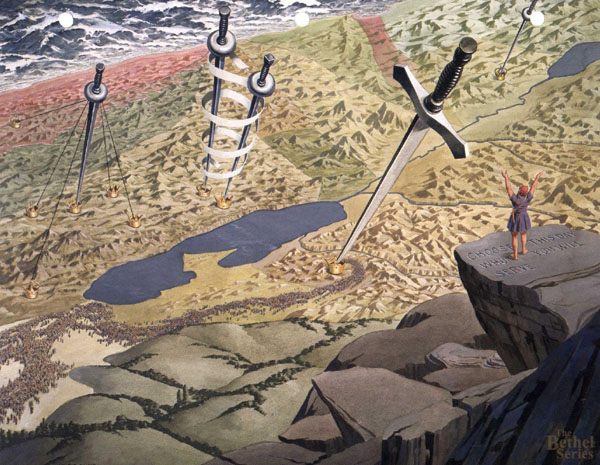- Transformation in the Wilderness - Forty years in the wilderness had done its work. The new generation, trained in the rigors of wilderness living, was a different people. Egypt had been washed out of Israel's blood. Disbelief had been replaced with a childlike trust in the Lord. A disciplined people stood ready to put its destiny into the hands of Almighty God..
- Israel Moves in From the South - The territories of the Edomites, Moabites, and Amorites stood directly in the path of a clear sweep to the Canaanite border. Military strategists within the Israelitic family would have chosen to apporach the coveted border of Palestine by way of the King's Highway, a commercial trade route which ran northward through the territories of both Edom and Moab. God would not permit Israel to interfere with the freedoms of either of these nations, for these people were descendents of Esau and Lot. Consequently, Israel took a detour and struck through the territory of the Amorites.
- First Major Battle - Designed to provide Israel with a staging ground from which to carry on the major campaigns across the Jordan. When Sihon, King of the Amorites, and Og, king of Bashan, had been crushed, the people of God had land on which to settle to prepare for the great push into Palestine proper.
- Second Battle at Jericho - Joshua led the second campaign. After preliminary preparations, and sending spies across the Jordan, Israel pushed across the river into Palestine. A memorial was erected, males born during the wilderness experience were circumcised, the passover was celebrated, and a crushing blow was leveled against the fortress city of Jericho.
- Jericho was the gateway city which controlled the movements of people to and from central Palestine. There could be no extensive infiltration of Canaan from the east without conquering Jericho first or the campaign would fail.
- The great powers of the day, Egypt and Mesopotamia, had a vital interest in the commercial trade route which ran along the western coast of Palestine. Had the attack came from the south or southwest, the trade would have been threatened, and Israel would have found itself involved in an international conflict.
- Third Campaign at Ai - The Jericho victors thrust at the fortress city of Ai, just west of the Dead Sea. The Israelites met defeat in the initial phase because there were those among the conquerors who were ready to abandon obedience to the Lord God. The temptation to yield to Canaanite practices overpowered Achan. Punishment came swiftly. The second attack at Ai was successful. Joshua and his army led the warriors of Ai into a trap from which there was no escape.
- Fear of Israel Spreads - The rumor of Israel's power had spread through all of Canaan. Petty kings of city-states in the south became increasingly alarmed over the strength of this desert tribe. Gibeon, a great military city, feared its own security was in jeopardy. The militarists in Gibeon worked out a strategy to make Israel their ally. The strategy worked.
- Southern Coalition Forms - The petty kings of the south formed a coalition to deal with the Gibeonites, traitors to the Canaanite cause. Five kings combined their forces and marched on Gibeon where they met more than they bargained for. The kings of Jerusalem, Hebron, Jarmuth, Lachish, and Eglon were captured and their city-states fell easily in a mop-up campaign carried out by Joshua's army.
- Northern Coalition Forms - The north formed its own coalition when news of the southern occupation arrived. They suffered the same crushing defeat as the south.
- Israel Stands Master of Canaan - Though all of the ladnd had not been possessed, Israel now dominated Palestine. The promised land was theirs and a part of the covenant with Abraham had been fulfilled.
- Joshua's Counsel - The unconquered fortifications along the western coastal plains and in the valleys of Jezreel and Jordan could pose a threat to Israel's destiny. To taste and savor a lasting triumph, Israel must pay close heed to the pronouncement which came from Joshua's lips when the battles were over:
"Now therefore fear the Lord, and serve him in sincerity and in faithfulness; put away the gods which your fathers served beyond the River, and in Egypt, and serve the Lord. And if you be unwilling to serve the Lord, choose this day whom you will serve, whether the gods your fathers served in the region beyond the River, or the gods of the Amorites in whose land you dwell; but as for me and my house, we will serve the Lord." (Joshua 24: 14-15)
|

